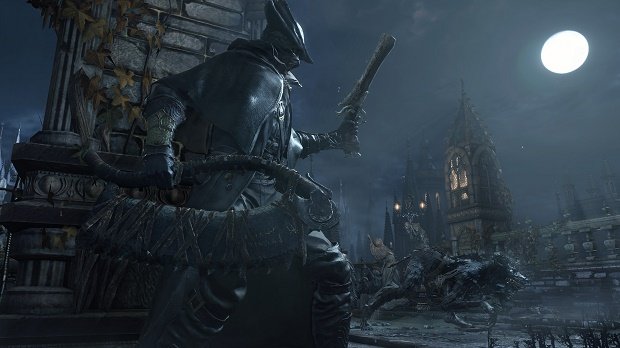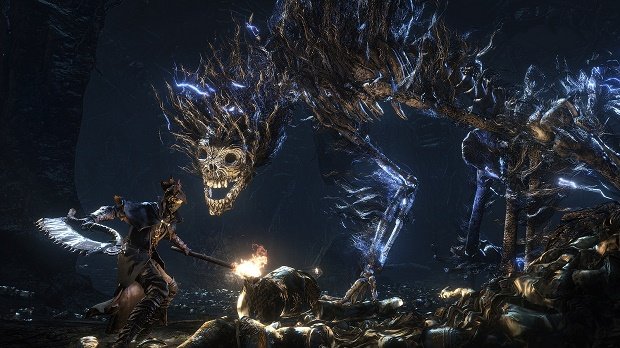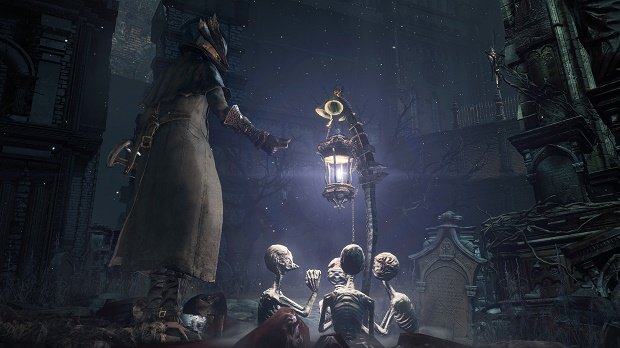When talking about a game is more fun than the game itself
"Ugh, this Blood-Starved Beast can go right to hell."
That was the entire body of an email I sent to a group of friends. We're all tackling Bloodborne at various speeds, and discussing our thoughts, our successes, and our failures with each other as we play. In response to my frustration, someone replied to my email and told me about a spot on the ground that will let you summon an NPC to help draw the Beast’s attacks. Heeding his advice, I finally defeated that eldritch bastard once and for all on my fifth try.
I felt a rush of emotions when I finally slaughtered my prey. There was of course the sense of satisfaction that comes from crushing a troublesome foe, but there was also a sense of camaraderie. Even though my friend wasn't in the same physical space as I was, even though he didn't even take part in the fight, he was still partially responsible for my victory. And then it dawned on me: I'm having as much fun (if not more) discussing Bloodborne with my friends as I am actually playing it.

Why is this the case? Why am I discussing strategies with my friends on Twitter at one in the morning? Why has no other game lit a fire quite like this inside me, where I not only want to poke and prod at its various secrets, but also share my findings with the world? The answer lies somewhere in our innate desire to band together, solve problems, and build upon each others' successes.
A long, long time ago, humanity lived in small groups, hunting and gathering the local flora and fauna and trying not to die before the age of twenty. As time passed, humans grew smarter, learned more about their surroundings, and used that information to improve their lives. And the rest of history played out like a game of Civilization. Irrigation gave way to more reliable harvests, which helped society expand and focus on things other than not dying; things like metalworking, masonry, and art. Future successes expanded on past ones, until we arrived at the present day, where we can sit in a room playing video games while stuffing our faces with tacos.
What does this have to do with Bloodborne? Well, everything. Bloodborne is essentially a microcosm of humanity's own desire to understand the unknown, to explore every inch of the world, and to report our findings back to our peers so we can further increase our shared knowledge. It's incredibly difficult, with death and failure lurking around every single corner, and its mechanics are largely obtuse, explaining nothing but the most basic of inputs; things that, typically, only the most niche of gamers should actually enjoy. In a landscape where hugely successful games like Call of Duty are built to be easily digestible, Bloodborne seems like it shouldn't exist. But it is precisely that difficulty, that mystery, those seemingly insurmountable challenges that tap into our innate survival instincts.

Other than a handful of button prompts and a few basic concepts, Bloodborne explains practically nothing to the player. What does Insight do? How do I summon players into my game? Holy shit, a giant hand came down and grabbed me and now I'm frenzied. What does this mean? We're left to figure this stuff out on our own, so we do what comes naturally: we band together to uncover every last mystery and beat the game at its own, well, game.
Weekly digests, tales from the communities you love, and more
So we turn to our fellow players, all of them experiencing the same struggles we are. How did you beat Father Gascoigne? Oh, did you find the [item redacted]? It'll help. When we take that information, go back to our game, and kick the crap out of that jerkface Gascoigne, it's the best feeling in the world. We want to share that feeling with everyone else, so we help others when they need it, whether it's on Twitter, on forums, or even using the in-game note sharing system. This creates a sense of shared victory, even in a mostly single-player game like Bloodborne; everyone who helps us overcome its challenges is just as victorious.
And even if you may have figured out how to take a boss down without taking advice from the greater internet, Bloodborne's internal notes and transparent specters were there to nudge you in the right direction. Sure, there are a few trolls out there trying to have a little bit of fun by leading you into harm's way, but almost everyone is out to help everyone else. There's a constant dialog between players both inside the game and out, as we all use our own individual talents to get a leg up and provide the same for our peers.

That sense of togetherness is important, and it's what elevates good entertainment into greatness. Humans are really good at dissecting problems, taking bits of previously learned information, and applying them to new quandaries. It's why we don't have to rediscover physics to send someone into space, or start all the way back at Pong every time someone wants to make a game. Since we're no longer huddling in a cave trying to figure out how fire works, we need an outlet for our own natural inquisitiveness and our need to tackle difficult challenges. Bloodborne does this perfectly by simply swapping out the looming threat of actual death with the digital equivalent, and sprinkling in some drooling were-beasts for good measure. Throw in the magical sharing power of the internet, and even the most frustrated novice can overcome the greatest challenges with a little help.
There's a saying that a rising tide raises all boats, and games like Bloodborne prove the power community can have in elevating the fun we can get out of a game, even when we find ourselves frustrated by it. By compiling all this knowledge and sharing our own individual experiences, we get to help others overcome the problems that troubled us and reap the rewards of others doing the same. So if you're having trouble defeating the Blood-Starved Beast, don't worry. We're here to lend a hand if you need it. You got this.



